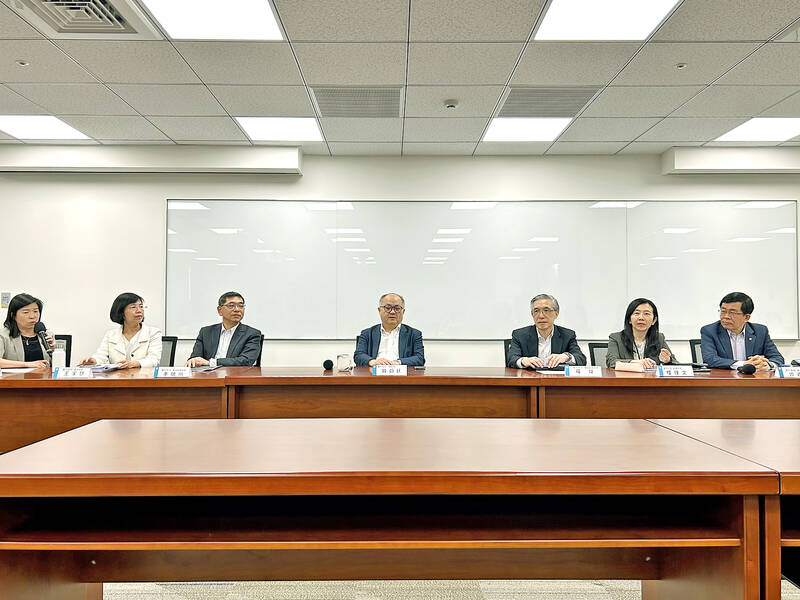Fubon Financial Holding Co (富邦金控) yesterday said it retained the most profitable status among peers after posting a net income of NT$13.98 billion (US$454.4 million) for last quarter when financial markets at home and abroad showed relative stability.
The financial results translated into earnings per share of NT$1.13, as all subsidiaries made contributions except its non-life insurance arm, Fubon Insurance Co (富邦產險), which remained unprofitable due to COVID-19 claims, the Taipei-based conglomerate said.
“The group managed to post stable earnings with help from subsidiaries,” Fubon Financial chairman Richard Tsai (蔡明興) said in a statement after an investors’ conference.

Photo: Wu Hsin-tien, Taipei Times
The banking arm, Taipei Fubon Commercial Bank (台北富邦銀行), has grown to be Taiwan’s largest private lender by number of branches after its merger with Jih Sun International Bank (日盛銀行) on April 1, Tsai said.
The lender last quarter saw its number of credit cards soar 3.8-fold to more than 800,000, due to a credit card partnership with Costco Wholesale Taiwan Ltd (台灣好市多) that contributed to 80 percent of the increase, it said, adding that credit card spending spiked 19.9 percent year-on-year.
Fubon Securities Co (富邦證券) gained noticeable market share and customers after integration with Jih Sun Securities Co (日盛證券) on April 9, Tsai said.
“Synergy benefits would become more evident in the future,” he added.
Fubon Life Insurance Co (富邦人壽) generated NT$7.25 billion in net income, making it the best performer among local peers, but it ranked second in terms of first-year premiums and total premiums, it said.
The life insurance arm made progress in boosting sales of policies paid in installments, lifting their share to 39.2 percent from 18.2 percent, the conglomerate said.
The group’s sales channels accounted for 70 percent of first-year premiums, it said.
Fubon Life Insurance yesterday updated its embedded value, which tumbled 18.2 percent from 2021 to NT$798.6 billion, or NT$64.4 per share, at the end of last year.
The company said the decline was due to capital market volatility weighing on insurance policy sales.
Against that backdrop, the value of new business fell 6.8 percent to NT$16.6 billion, it said.
The conglomerate said it has a neutral view about the local bourse, and it posted NT$16.3 billion in profit last quarter.
It prefers range trading in times of economic uncertainty, it said.

PROTECTION: The investigation, which takes aim at exporters such as Canada, Germany and Brazil, came days after Trump unveiled tariff hikes on steel and aluminum products US President Donald Trump on Saturday ordered a probe into potential tariffs on lumber imports — a move threatening to stoke trade tensions — while also pushing for a domestic supply boost. Trump signed an executive order instructing US Secretary of Commerce Howard Lutnick to begin an investigation “to determine the effects on the national security of imports of timber, lumber and their derivative products.” The study might result in new tariffs being imposed, which would pile on top of existing levies. The investigation takes aim at exporters like Canada, Germany and Brazil, with White House officials earlier accusing these economies of

Teleperformance SE, the largest call-center operator in the world, is rolling out an artificial intelligence (AI) system that softens English-speaking Indian workers’ accents in real time in a move the company claims would make them more understandable. The technology, called accent translation, coupled with background noise cancelation, is being deployed in call centers in India, where workers provide customer support to some of Teleperformance’s international clients. The company provides outsourced customer support and content moderation to global companies including Apple Inc, ByteDance Ltd’s (字節跳動) TikTok and Samsung Electronics Co Ltd. “When you have an Indian agent on the line, sometimes it’s hard

‘SACRED MOUNTAIN’: The chipmaker can form joint ventures abroad, except in China, but like other firms, it needs government approval for large investments Taiwan Semiconductor Manufacturing Co (TSMC, 台積電) needs government permission for any overseas joint ventures (JVs), but there are no restrictions on making the most advanced chips overseas other than for China, Minister of Economic Affairs J.W. Kuo (郭智輝) said yesterday. US media have said that TSMC, the world’s largest contract chipmaker and a major supplier to companies such as Apple Inc and Nvidia Corp, has been in talks for a stake in Intel Corp. Neither company has confirmed the talks, but US President Donald Trump has accused Taiwan of taking away the US’ semiconductor business and said he wants the industry back

PROBE CONTINUES: Those accused falsely represented that the chips would not be transferred to a person other than the authorized end users, court papers said Singapore charged three men with fraud in a case local media have linked to the movement of Nvidia’s advanced chips from the city-state to Chinese artificial intelligence (AI) firm DeepSeek (深度求索). The US is investigating if DeepSeek, the Chinese company whose AI model’s performance rocked the tech world in January, has been using US chips that are not allowed to be shipped to China, Reuters reported earlier. The Singapore case is part of a broader police investigation of 22 individuals and companies suspected of false representation, amid concerns that organized AI chip smuggling to China has been tracked out of nations such